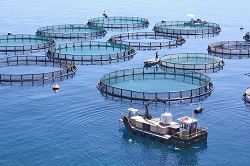Healthier salmon benefits human well-being and boosts aquaculture’s competitiveness
It is widely known that regularly eating oily fish like salmon sourced from the Atlantic is beneficial to human health. It’s packed with protein and is good for the heart. But at the same time Europe’s seas are suffering from severely depleted fish stocks. So it’s not surprising that farmed fish – or aquaculture – is on the rise. Today, farmed fish account for around half of all fish consumed in the world. One EU-funded project has delved into how to make farmed fish even healthier via the food the fish eat, potentially boosting the global competitiveness of EU salmon. OMEGA3MAX has produced novel scientific knowledge on the use of antioxidants including polyphenols in Atlantic salmon diets. Polyphenols are a type of chemical found naturally in many healthy foodstuffs including fruit, vegetables, green tea, spices and olive oil. It is believed that eating them can help prevent degenerative diseases such as cancer and cardiovascular diseases. In its project results, OMEGA3MAX conceded that much remains to be done to fully implement the use of new antioxidant sources in Atlantic salmon. However, the project has created a knowledge base which paves the way for the use of some natural antioxidants including polyphenols. ‘In this project, we have shown that we can enrich salmon fillet with antioxidants such as gamma tocopherol – a vitamin E isomer with important antioxidant and anti-inflammatory properties,’ says Dr. David Menoyo Luque, OMEGA3MAX project coordinator. Boosting the aquaculture industry OMEGA3MAX is also hoping that its findings will have practical applications in the aquaculture industry. ‘If farmed fish have optimal husbandry conditions, good health and adequate feed which is well-suited to the physiological needs of the farmed animals, then growth and production levels will be boosted to the benefit of the industry,’ Dr. Menoyo explains. The project set out to discover ways to boost the health and health-giving properties specifically of farmed salmon. ‘Farmed fish such as Atlantic salmon are a rich source of healthy long chain polyunsaturated fatty acids including the marine eicosapentaenoic acid (EPA) and docosahexaenoic acid (DHA), high quality protein, vitamin A, B12, D and E and minerals like iodine and selenium,’ continued Dr. Menoyo. Whilst these health properties are established, scientific advances are showing how to enrich the particularly good nutrients and diminish ones that have been raised as a concern. ‘The scientific community has been trying to identify important health promoting compounds found in food. Recent advances in animal production technologies and practices, like those used in our project, have shown that it is possible to increase the concentration of these compounds in animal tissue to boost the nutritional value for the consumer,’ he adds. OMEGA3MAX tested twelve different antioxidant substances on farmed Atlantic salmon. Of these, one was found to enhance the omega3 fatty acid - EPA and DHA - concentrations in fish fillets compared to fish not fed with the antioxidant supplement. Ultimately the project hopes it has provided practical recommendations to improve fish performance and meat quality. ‘Our project can help the industry develop novel cost-effective feeding strategies that can support the sustainable development of the EU’s aquaculture industry,’ Dr. Menoyo concludes. For more information please see: OMEGA3MAX project website
Countries
Spain



